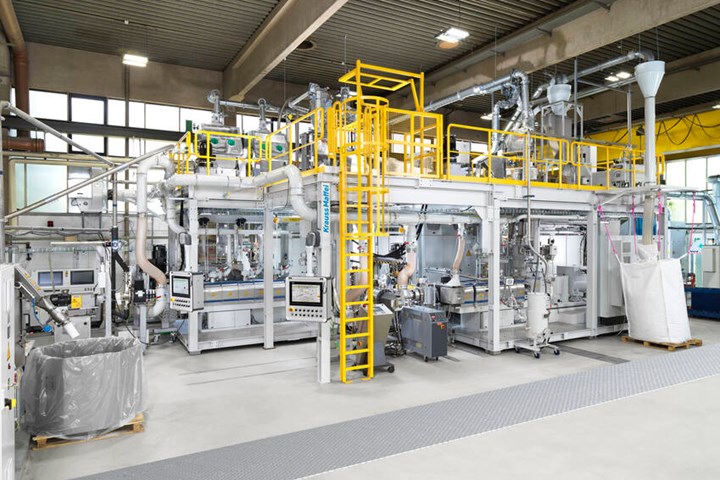KraussMaffei recompounding line available for customer trials
Applicable for extrusion and injection molding, the line enables all post-consumer LDPE, HDPE, PP or PS fractions to be processed into recompounds.
Share
Read Next

Source | KraussMaffei
KraussMaffei Technologies GmbH (Munich, Germany) announced on June 16 that its EdelweissCompounding recompounding line is now available for customer trials. Applicable for compounds used in injection molding and extrusion, KraussMaffei points to the line’s proprietary cutter-compactor unit for recycling post-consumer waste, and the two-stage extrusion system, composed of two twin-screw extruders arranged in a series for melt processing and compounding.
The two ZE 65 twin-screw extruders from the company’s ZE BluePower Torque series, are designed for a maximum output rate of 2,000 kg/h. KraussMaffei also notes that, compared to combining a single-screw and a twin-screw extruder, its solution results in more efficient odor removal, improved homogenization of the input material, high degassing capacities and gentle melt treatment, with little limit to the throughput rate.
In the first stage, the ZE65 BluePower twin-screw extruder degasses the starting material and removes any adhering odorous substances. KraussMaffei says odor minimization can be intensified by using water, nitrogen or carbon dioxide as entrainer for degassing. Then, via a melt pipe, the melt is conveyed into the second twin-screw extruder where the actual compounding process takes place. The company notes that the extruder is designed for filling, reinforcing, pigmenting and incorporation of additives, and is equipped with additional units for metering pellets, powder, fibers and liquids. With this solution, all post-consumer LDPE, HDPE, PP or PS fractions can be easily processed into recompounds and used as a substitute for new material in both injection molding and extrusion applications.
Further, the twin-screw extruders are also furnished with gravimetric metering systems for various media, as well as with downstream equipment such as fine filters, pumps and pelletizing units from BKG-Systems, supplied by the adhesive manufacturing company, Nordson Corporation (Westlake, Ohio, U.S.).
KraussMaffei notes the cutter-compactor unit attached to the Edelweiss line is an ideal solution for light fractions, such as fiber and film scrap with high input moisture contents of up to 10%. In the cutter-compactor, the material fraction is first dehumidified, compacted and homogenized before it is transferred into the ZE 65 BluePower extruder. The compactor unit is operated offline, and the agglomerate material produced is discharged into a belt weigher, enabling accurate gravimetric metering of 99.8%.
Additionally, the EdelweissCompounding line is integrated into a turnkey module for easy installation, rapid set-up and start-up and flexible use. Reportedly, the module can be transported as a whole in the event of relocation and is ready for production without any changes required.
Related Content
-
The next evolution in AFP
Automated fiber placement develops into more compact, flexible, modular and digitized systems with multi-material and process capabilities.
-
Plant tour: Albany Engineered Composites, Rochester, N.H., U.S.
Efficient, high-quality, well-controlled composites manufacturing at volume is the mantra for this 3D weaving specialist.
-
Manufacturing the MFFD thermoplastic composite fuselage
Demonstrator’s upper, lower shells and assembly prove materials and new processes for lighter, cheaper and more sustainable high-rate future aircraft.
















